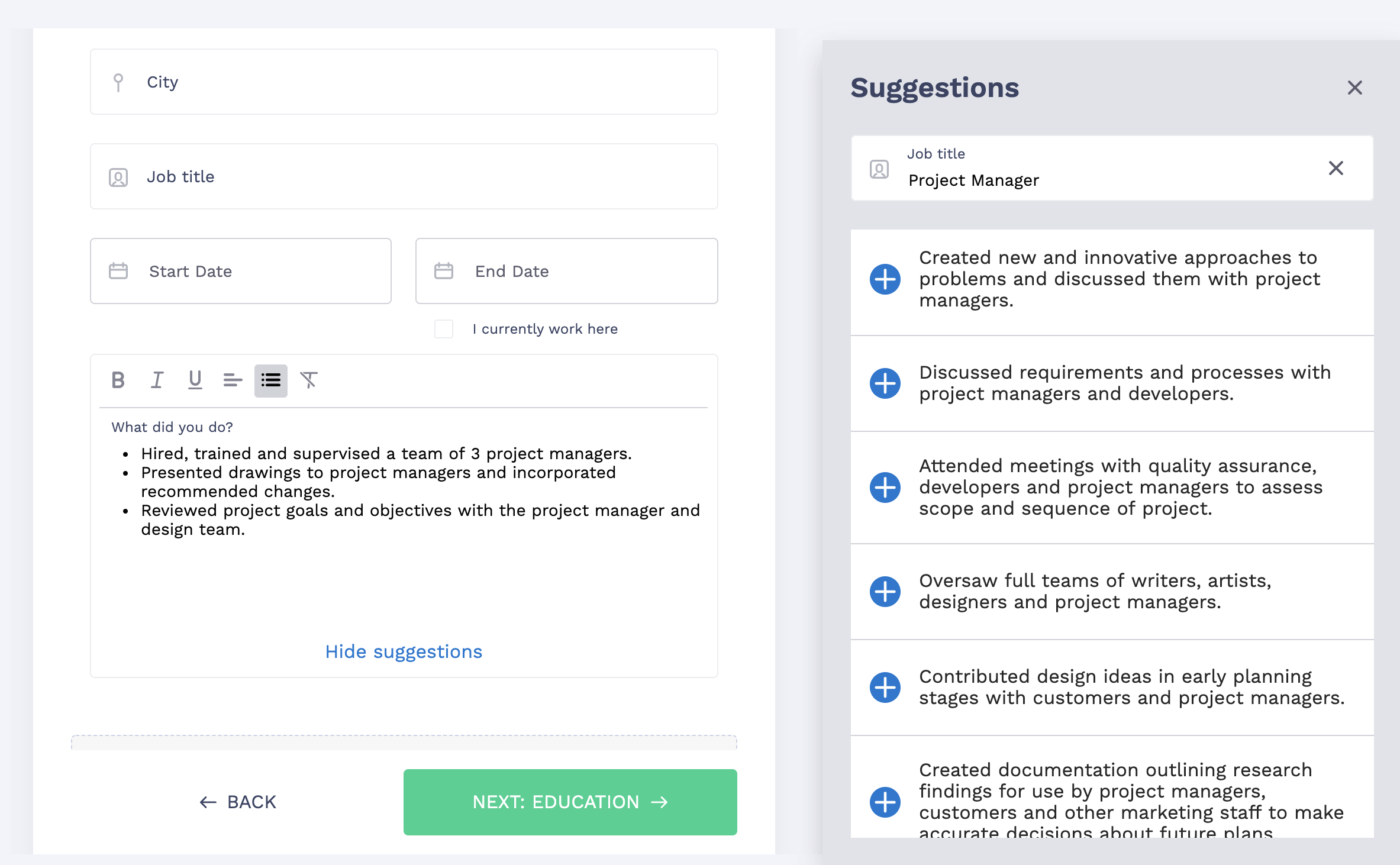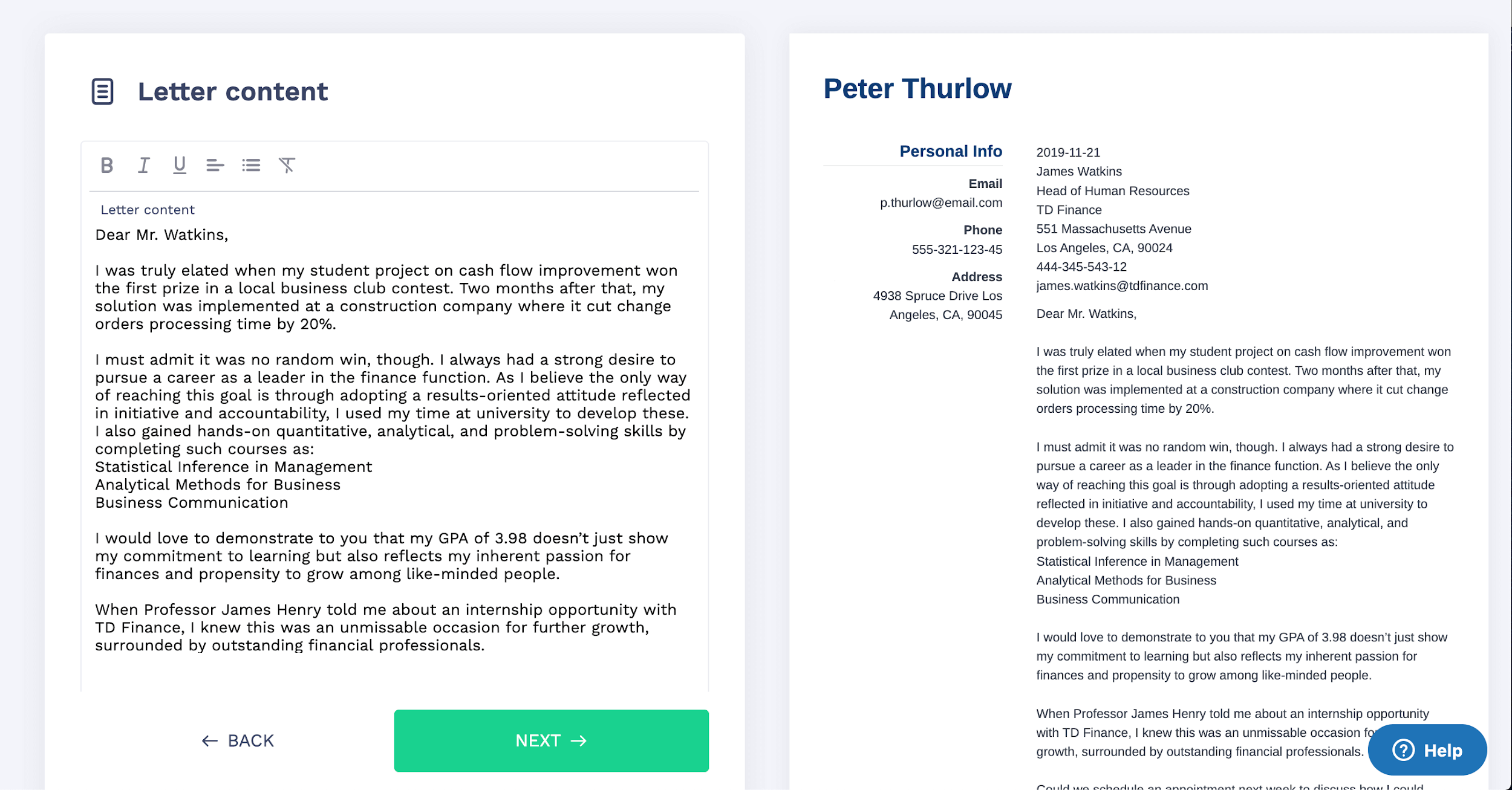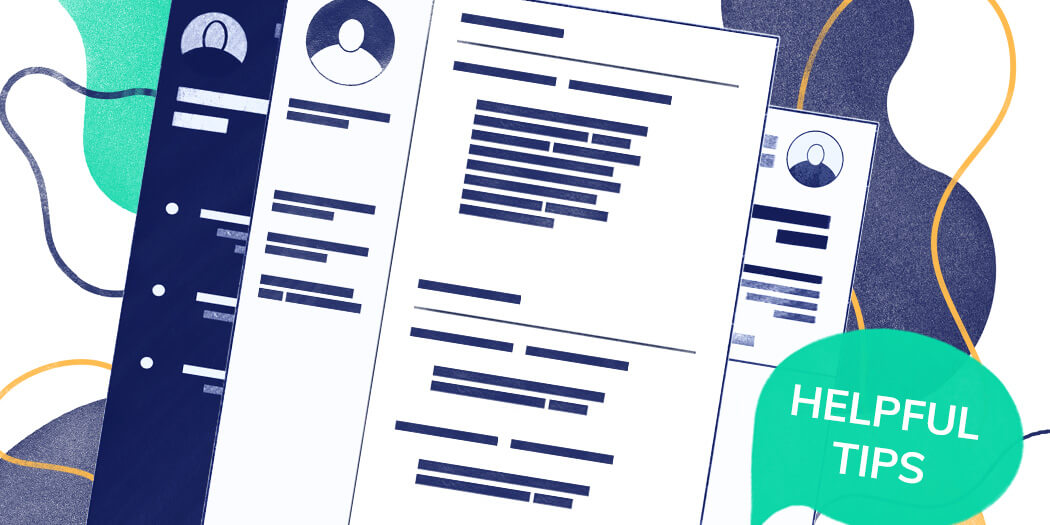
How to Write an Internship Resume: 3 Examples & Guide

Roma Kończak, CPRW
Career Expert
You’re looking for a job, and your friend said he’d got one to recommend. He briefly explained key responsibilities for the role and added at the end in haste: “You need to have 2–3 years of relevant experience”.
So you’re racking your brain trying to understand what did he really mean by this. What does the relevant experience mean? What is it relevant to? And how can you even measure it? Wonder no more. Read through the relevant experience definition and examples to unravel it.
This guide will show you:
Save hours of work and get a job-winning resume like this. Try our resume builder with 20+ resume templates and create your resume now.

What users say about ResumeLab:
I had an interview yesterday and the first thing they said on the phone was: “Wow! I love your resume.”
Patrick
I love the variety of templates. Good job guys, keep up the good work!
Dylan
My previous resume was really weak and I used to spend hours adjusting it in Word. Now, I can introduce any changes within minutes. Absolutely wonderful!
George
Want to perfect your resume? Check out these guides:
Relevant experience is any kind of professional experience that matches a job profile. It’s not only the experience gathered within the exact same industry, but also the expertise gained through other job professions. Adding your relevant work experience to a resume helps a recruiter get a grasp of how it can translate into the company's mission and day-to-day efforts.
For example, if you’re seeking a marketing specialist position, your relevant experience might include either a social media strategist or a shopkeeper role. It is because both of them fuel your candidate's potential with accurate skills and knowledge. In this case, your portable skills are centered around communication, customer service, and sales, and they fit right in a marketing gig.
Let’s imagine this. You’re competing for a job as an English teacher, and you have your Bachelor of English Language and Linguistics. But they want you to prove already at least 1+ year of relevant experience. Can you think of any activities that helped you test yourself in teaching?
Experience and professional knowledge derive from assorted areas. Here’s where relevant experience can be rooted:
So—what about a homework club? Recall times when you spent hours lecturing English basics, slowly growing into the role. Or, what about that summer internship where you performed as a translator? Bingo! It can easily fill in your relevant experience container.
Understanding the meaning of relevant experience is already half of the way. The other one is to present it in a manner compatible with a job posting. In other words, the work experience section should answer a hiring manager's expectations and affirm you’re on the same wavelength.
Here’s how to list the resume’s relevant work experience:
Reading a job ad thoroughly is step number one. A job offer might look like a chunk of gold, but the requirements determine whether you can own it. Examine the job description concerning demanded skills, job responsibilities, or education prerequisites, and think if they’re akin to your own abilities.
Once studied the job description, extract the key terms that describe the role and create a whole image of an ideal candidate. To make it easier, write up a listing of qualifications demanded by a recruiter and pair them with your own assets.
Do they correspond with each other? If you have any on your list that don’t qualify for the role, cross them off. Those that stay are the representation of your relevant experience.
So you’ve identified your critical skills and abilities that fit the role. Now, you need to put them into words to make a recruiter immediately know you’re a match. When creating work experience bullets, focus on quantifiable achievements. Just recall the situations when you used your skills and knowledge, and achieved successes that can be expressed in numbers.
Describing your relevant experience will vary depending on its scope. Let’s take a few examples to illustrate how you can approach it based on former experience.
Example 1
Let’s imagine that you’re applying for the role of financial accountant. So far, you’ve worked as an office assistant for over a year. They expect you to set up financial reports and evaluations, analyze cash balances and fund requirements, and conduct internal audits to ensure that expenditures align with contractual obligations.
Here’s how to put forward your relevant experience:
Office Assistant
CrowdStrike, Remote
January 2022–March 2023
Key Qualifications & Responsibilities
Example 2
Now, put yourself in someone else’s shoes. Let it be an enthusiastic student seeking a fitness instructor job. You have a Bachelor’s in Health and a summer internship experience where you took on an animator role. They want you to have exceptional communication skills, run high-quality classes, and assist participants in their training development.
Take a look at how you can adjust your previous job description to the new role:
Hotel Animator
Good Story Vacations, NJ
July 2022–September 2022
Key Qualifications & Responsibilities
Example 3
And what if you have vast experience in one industry but strive for a role in the other? Let’s take an experienced marketing leader who wants to pursue a new career as an HR assistant. A job posting dictates: assists with day-to-day operations of HR functions and duties, compiles and updates employee records, coordinates HR projects, and manages communication processes.
Here’s how you can reply to these requirements by making use of your relevant experience:
Marketing Lead
PanelPlace, Remote
June 2020–March 2023
Key Qualifications & Responsibilities
The ResumeLab builder is more than looks. Get specific content to boost your chances of getting the job. Add job descriptions, bullet points, and skills. Easy. Improve your resume in our resume builder now.

Nail it all with a splash of color, choose a clean font, and highlight your skills in just a few clicks. You're the perfect candidate, and we'll prove it. Use our resume builder now.
To understand how many years of relevant experience you have, check how is your former experience pertinent to a role you’re applying for. Besides key responsibilities, consider if demanded job skills overlap with your capabilities. Remember that some of them are transferable, meaning you can take them from one job to another. A great example of this is communication skills valued in many positions.
There are two instances in which you might rag on having a little relevant experience—you’re either a fresh graduate or going through a career transition. Believe it or not, you already have some relevant experience to look back on.
As a university student, you might have had a chance to participate in some extracurricular activities, projects, and initiatives. All of these qualify for the relevant experience if you can only find common ground between them and your chosen job.
If you’re about to make a career move, you likely have transferable skills that appeared useful in your former position and can be leveraged in a new job. These are usually soft skills such as communication, teamwork, problem-solving, time management, or decision-making.
Double your impact with a matching resume and cover letter combo. Use our cover letter generator and make your application documents pop out.

Want to try a different look? There's 21 more. A single click will give your document a total makeover. Pick a cover letter template here.
During recruitment processes, much emphasis is placed on relevant skills and achievements to hunt a candidate already prepared for a new role. The good news is that many professions convey responsibilities and skills versatile for a great range of positions.
If you want to prepare a work experience section that is relevant to a chosen position, keep in mind the following:
Need help with relevant experience and how to incorporate it into your resume? Not sure what counts as relevant experience? Share your thoughts in a comment. We’ll be happy to assist you.
At ResumeLab, quality is at the crux of our values, supporting our commitment to delivering top-notch career resources. The editorial team of career experts carefully reviews every article in accordance with editorial guidelines, ensuring the high quality and reliability of our content. We actively conduct original research, shedding light on the job market's intricacies and earning recognition from numerous influential news outlets. Our dedication to delivering expert career advice attracts millions of readers to our blog each year.


Roma Kończak, CPRW
Career Expert

You can stop searching—this is the ultimate collection of best resume tips that can help you succeed in 2026. These resume writing tips will help to impress hiring managers.

Roma Konczak, CPRW
Certified Professional Resume Writer, Career Expert
![How to Write a Cover Letter for Any Job [2025 Guide]](https://cdn-images.resumelab.com/pages/how_to_listing.jpg)
A cover letter can make or break your entire job application. Discover how to write a cover letter that will impress any recruiter.

Olga Ber
Career Expert